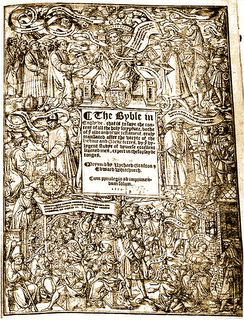Reading Scripture With Windsor.

Provoked by a meeting with rancorous clergy (i.e., me), Richard Kew returns to the Windsor Report and offers helpful reflections:
"Windsor envisages us reading the Scriptures in communion with one another, for in paragraph 62 it states that since the Spirit inspires Scripture, the Bible ought to be the means of unity and not division. "In fact, our shared reading of scripture across boundaries of culture, region and tradition ought to be the central feature of our common life, guiding us together into an approriately rich and diverse unity by leading us forward from entrenched positions into fresh appreciation of the riches of the gospel as articulated in the scriptures."What, in fact, Windsor is saying is that now that we are a genuinely global community of believers, and able to be in close communication with one another, there is no excuse for us to hide behind our own cultural barriers and preferences when it comes to the manner in which we handle the Word of God. While I am absolutely certain that those in the Global South bring their own slant to the manner in which they use Scripture, so are we in the West..."
Read the whole thing. I would add that while reading Scripture, as Windsor and Richard note, is a task of the whole community, it is vital to remember that that community is properly called the Communion of Saints, and it stretches not just around the world, but through time (and into eternity). This being the case, it then follows that a communal reading is necessarily to some degree a "pre- (not 'anti-') critical" reading. We (those of us who happen to be walking around) are the bearers of an authoritative Tradition - which, as Jaroslav Pelikan famously noted, is "the living faith of the dead, not the dead faith of the living". The Bible is the Church's book before it is the academy's. Rusty Reno makes the point in his preface to the new (and highly recommended)
"Is doctrine, then, not a moldering scrim of antique prejudice obscuring the Bible, but instead a clarifying agent, an enduring tradition of theological judgments that amplifies the living voice of Scripture? And what of the scholarly dispassion advocated by Jowett? Is a noncommitted reading, an interpretation unprejudiced, the way toward objectivity, or does it simply invite the languid intellectual apathy that stands aside to make room for the false truism and easy answers of the age?This series of biblical commentaries was born out of the conviction that dogma clarifies rather than obscures..."

0 Comments:
Post a Comment
<< Home